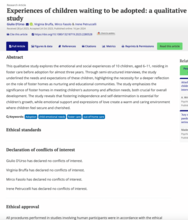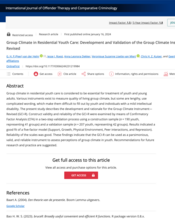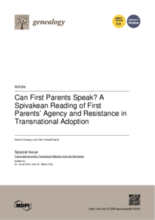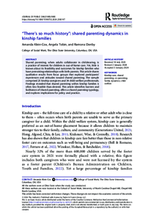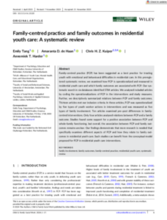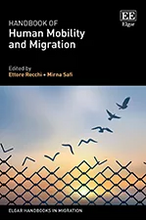Displaying 311 - 320 of 10391
This qualitative study explores the emotional and social experiences of 10 children, aged 6–11, residing in foster care in Italy before adoption for almost three years. Through semi-structured interviews, the study underlined the needs and expectations of these children, highlighting the necessity for a deeper reflection on the role of foster homes as nurturing and educational communities.
Group climate in residential youth care is considered to be essential for treatment of youth and young adults. Various instruments exist to measure quality of living group climate, but some are lengthy, use complicated wording, which make them difficult to fill out by youth and individuals with a mild intellectual disability. The present study based in the Netherlands describes the development and rationale for the Group Climate Instrument—Revised (GCI-R).
This is a report about the Parental Rights in Prison Project (PRiP) based in Wales and England aimed at supporting incarcerated parents who wished to sustain their relationship with their children who are in the care of the local authority, care of family and significant others or adopted and to provide them with legal advice and support around their rights as parents.
This article analyzes ethical issues arising in transreligious foster care placements in relation to foster children’s needs regarding religious socialization and identification. Applying Urban Walker’s expressive-collaborative framework to 30 qualitative interviews with foster parents, foster children, parents, and professionals, the authors elaborate and apply a three-level reflection on Christian foster parents’ ethics of care in everyday practice of foster care.
This article analyses the search strategies of first families in Bolivia contesting the separation of their children through transnational adoption. These first parents’ claims to visibility and acknowledgement have remained largely ignored by adoption policy and scholarship, historically privileging the perspectives of actors in adoptive countries, such as adoptive parents and adoption professionals.
Drawing on data generated through a substantial ethnography in one secure children's home in England, this paper uses Goffman's (1961) theorising as a conceptual lens to view the institution.
The study is the first analysis of the medical records of children as young as six months old and a median age of nine years old detained between June 2018 and October 2020 at Karnes County Family Residential Center in Texas. The report documents evidence of mental and physical harm relating to inadequate and inappropriate medical care experienced by children during prolonged detention.
Shared parenting, when adults collaborate in childrearing, is a practice of interest for children in out-of-home care. Yet, little is known about its feasibility and outcomes for kinship families who have preexisting relationships with birth parents. This article shares qualitative results from focus groups that explored participants’ experiences and attitudes toward shared parenting in the U.S.
Family-centred practice (FCP) has been suggested as a best practice for treating youth with emotional and behavioural difficulties in residential care. In this preregistered global systematic review, the authors examined how FCP is operationalized and measured in residential youth care and which family outcomes are associated with FCP.
This chapter, which is part of the "Handbook of Human Mobility and Migration" reviews the literature on child migration, highlighting how children compare from adults in their migratory aspirations and migration decision-making, as well as in their experiences in receiving countries in the European and US contexts, where groups of children such as unaccompanied minors benefit from humanitarian protections unavailable to adults.

